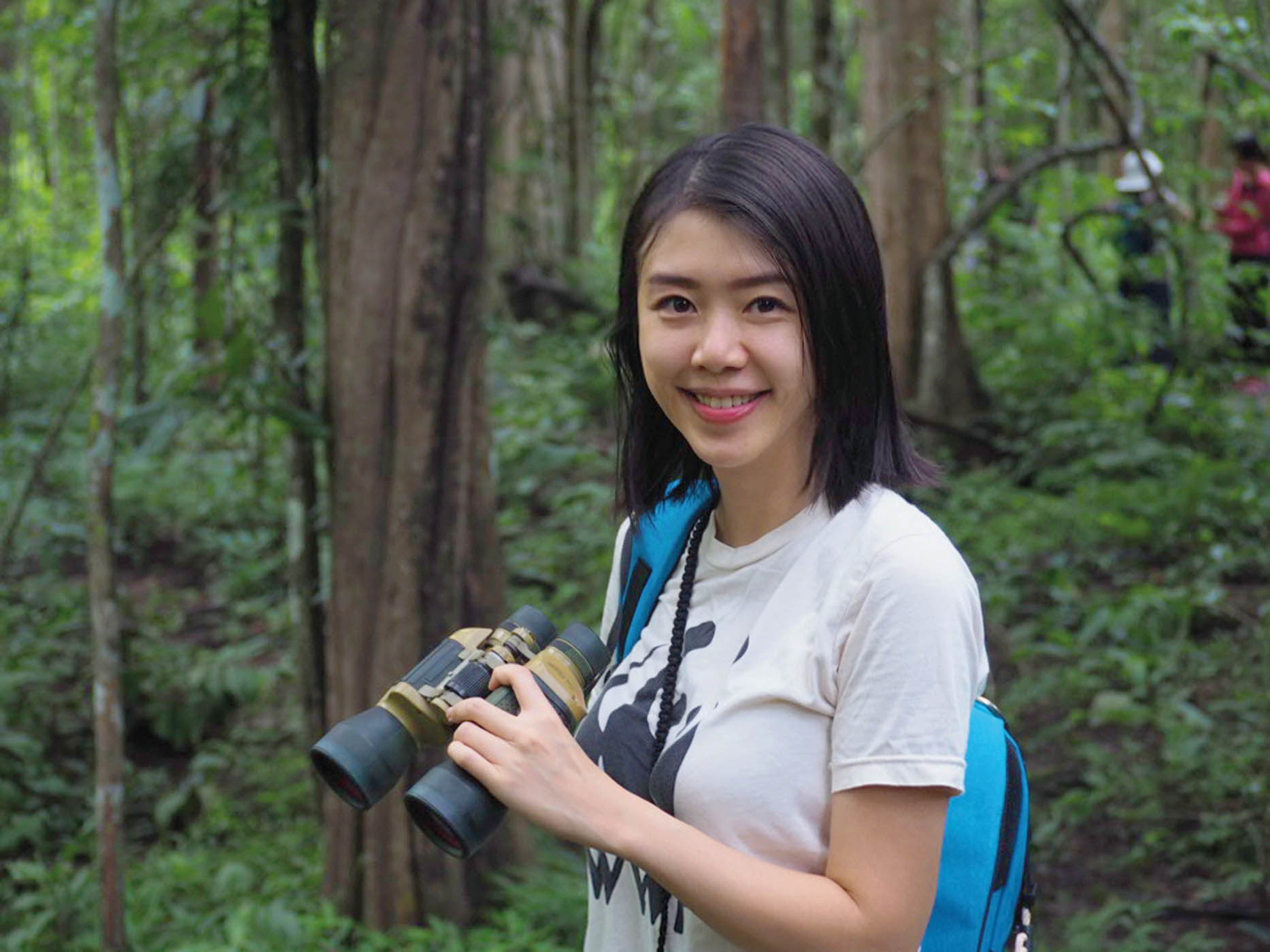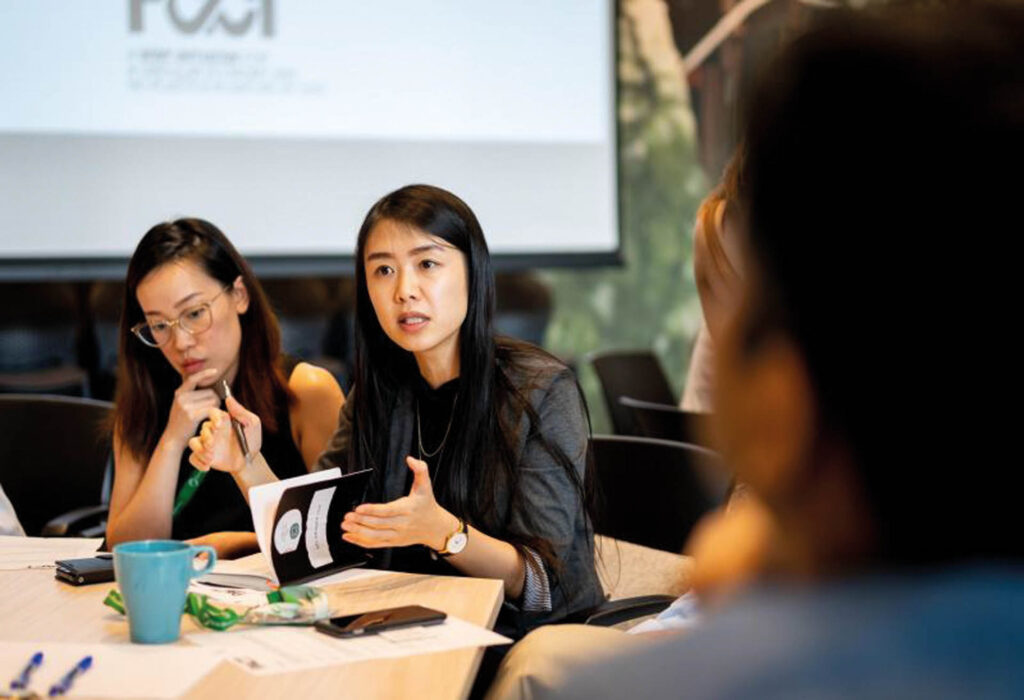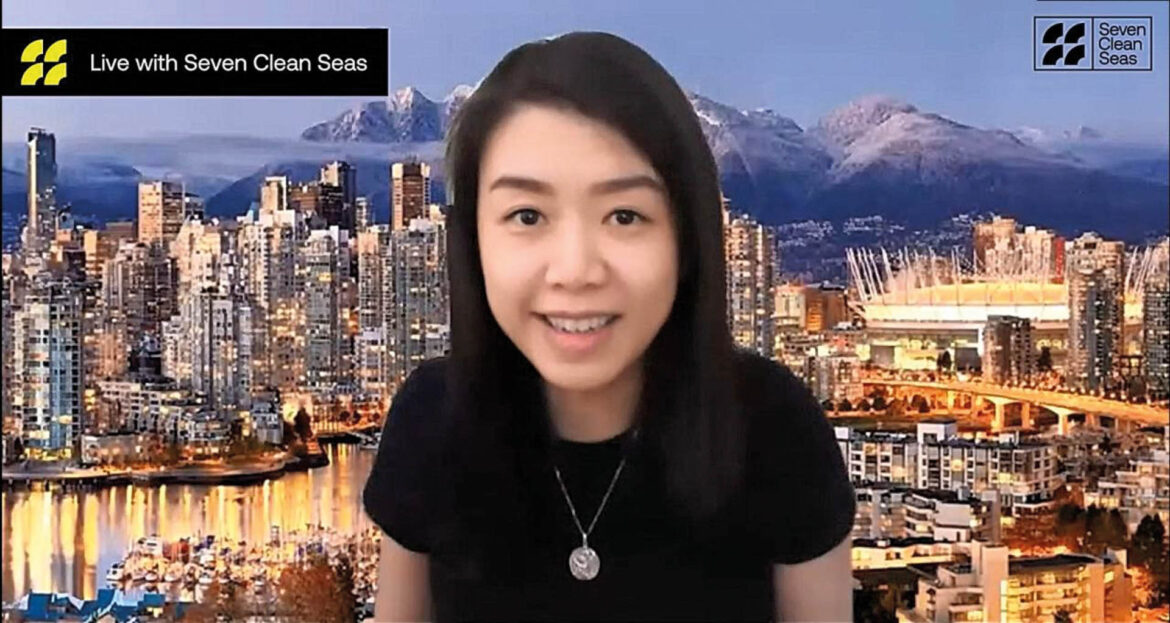
mensanthropist [ men-san-thruh-pist ] noun
a person, who actively participates in fulfilling one of Mensa’s objectives by fostering and utilizing intelligence for the benefit of humanity
For the 8th episode I interviewed Maggie Lee, Canadian Mensan from Hong Kong living in Bangkok, founder of the „Mensans for Sustainability“ Facebook group, a „scientist-turned-conservationist“ who gave a TEDx talk about how we all can have big impact on our environment by changing our little habits.
Maggie, in your Mensa profile, you write that you’re a Hong Kong Canadian. Can you explain what that means?
People usually don’t talk about the birth city, they use a country. I was born in the only place in the world with an expiry date. Hong Kong actually had 1997 set as a deadline for its existence autonomously and finally lost its autonomy last year. It took a little bit longer than that to actually activate the expiry, but it’s official now. I grew up in Canada because we had to leave our homes in Hong Kong. But I really do hope that it stays relevant, so I always emphasize that I’m from Hong Kong. I currently live in Bangkok but my friends and everyone I grew up with is either in Vancouver or in Hong Kong.
You joined Mensa about four years ago, right? What convinced you?
I had an ex-boyfriend who didn’t really have any hobbies but wanted to play board games. In our quest to find people who can play board games with him in Singapore, I found Mensa, which was this obscure high IQ club, but very serious about board games. I saw that you have to take a test to get into the club. So that’s exactly what I did.

Do you find any benefits for yourself of being Mensan?
I truly enjoy EMAGs, they are very eye opening and I get to go to places that I previously wouldn’t have thought of going. I really enjoyed liaising and also socializing with the European members, particularly because they are very knowledgeable and have a very different perspective. I grew up in North America and my home is in Asia, so I have already quite a lot of organic networks. But I find the European Mensan gatherings especially interesting because the cultures are so much more different.
I read on your website that you already visited 52 countries. Which one did you find the most interesting?
It’s really hard to say because each one of these territories and countries have their own uniqueness. I always find Japan to be one of the very odd countries that completely stand out. Everything is different there. Even though they have a lot of cultural similarities with Chinese speaking countries, it is still beyond my imagination most of the time.
Which country are you probably the most looking forward to visiting in the future?
I think there are two, Bhutan and Pitcairn Island. Bhutan is a little bit expensive to go to, but it’s the first carbon negative country in the world, and Pitcairn Island is the most remote island that’s inhabited by people. It has only 50 inhabitants.
You started your work career in the food industry, right?
I spent a year teaching English in Japan. Then I started working in the food industry because I had a food degree. I worked for hamburger chains in Hong Kong. So that’s actually food services, not food production. I was just a full time person flipping burgers, serving up meals.
So you were not utilizing your degree?
Not really. Only the bit about food safety, because we learn about food poisoning problems associated with cooked and uncooked food. I then went to AEON and worked as a quality assurance and food control officer there, until I finished my Masters. Then I moved on to Nestlé, where I was doing regulatory and scientific affairs, and also working in quality assurance. Nestlé was finally the beginning of my professional career with food and regulatory. From there I went on to Procter & Gamble, where I started a six year stint in the R&D, which included the technical and regulatory details of launching a product, and also a little bit of safety and sustainability.


There you actually started digging deeper into sustainability. What was the impulse?
There were a few times in my career prior to becoming a full time sustainability professional, when I realized that our products have a very big impact on the planet. The first one was when I was auditing a slaughterhouse at a cattle farm. It was not so much the cruelty that actually bothered me. It was more about the consumption of feed and fresh water and also the carbon footprint associated with everything to grow beef. I gave a TED talk about this and decided that I’m not going to eat meat because of how much it consumes for the environment.
Then I also made a shocking discovery when I realized that fast moving consumer goods have no linkage to waste management. When you buy detergent or soap, you would think that the manufacturers have coordinated with the local governments so that they could process all those things that are going down as chemicals inside your bathtub or inside your toilet or maybe to your garbage can. But there is no coordination whatsoever. The environment just has to suck it up.
I tried to create a sustainability team within P&G and was very thankful that they were happy for this kind of intrapreneurship. At that point I realized that if I were to get out of the box, I could push the box from outside much more effectively than while sitting in the box. Just like a cat, right? Cats really like boxes. They like to sit in the box. But imagine a cat sitting in a box and trying to scoot around to make the box move. It’s really difficult to do that. So why don’t you get out of the box and push it from the outside? So I left Procter & Gamble after six years of service, and joined the World Wide Fund for Nature, one of the biggest environmental NGOs in the world. They are very passionate about creating solutions instead of being just the watchdog. I started working there as a market transformation manager, creating solutions for businesses.
You have to understand how business works before you can actually propose something, because it’s not like they never thought about it. They have thought about it, but they just feel it’s not financially attractive to choose a more sustainable solution. With WWF I worked in Singapore and it was some of the best years of my life, creating solutions and also working closely with businesses, seeing how they transform, seeing how they commit to strategies that are better for the environment.


After two years time, I had to move to Bangkok with my then fiancee and now husband. So I left WWF and went to work for the United Nations at the United Nations Environment Program. I was in charge of a regional initiative sponsored by the Swedish government, which had a very big plan for Thailand, Viet Nam, Indonesia, the Philippines, Malaysia and Cambodia. It was mostly on marine litter. How do we actually manage plastics so that it does not become marine litter? And what happens when marine litter comes about? How do we detect it? How do we control it? How do we take it out of the environment?
There I managed to meet a lot of stakeholders and one of them were my current employer Verra. They were processing and issuing carbon credits, but they have also created a very good plastic standard. I wanted to create something like that, but wasn’t able to. I actually wrote quite a few papers that were published in academic journals about how plastic credit should be used by the commercial sector. So later on, I ended up working for Verra full time.
I also hold another position at WWF again, this time for seafood, which is completely different, but they’re both linked to standards. We’re writing out what people should do when it comes to seafood and plastics. I feel that’s what the world needs, more standards. We need to find a way so that people can report it so that the manufacturers could speak with the government about it.
On your website you mention pescetarianism. So are you pescetarian?
I’m not vegan by far, but if I cannot find vegetarian food, I would opt for seafood because it is one of the lower carbon proteins. Also in Asia, there’s just very little vegan or vegetarian food, especially in places like Japan or Thailand.
Do you see it possible in the future for our oceans to produce enough of it so that everyone can become pescatarian?


Sustainable aquaculture is quite promising at the moment, especially with traceable and sustainable feed from insect protein (such as black soldier fly larvae). From a resource perspective, the feed conversion ratio (the amount of feed by kg to yield for 1 kg of edible seafood product) is very high and comparatively sustainable.
Do you think that what we eat is one of the most impactful habits we have?
What we eat is very crucial to the survival of our planet. The next part is what we don’t eat. Food waste is one of the most carbon emitting environmental problems we have right now, aside from production of energy, of course. So there’s production of energy, transportation, and third is food waste. If you evaluate its carbon emission as a whole, it is actually at the level of a country. United States are the biggest carbon emitter in the world as a country. Then you have China and then you have food waste. And it’s not even gone to a good place. It becomes waste we have to handle. It becomes more carbon emitting substances when they release methane from the fermentation.
A lot of us feel that we work very hard and we we sustain a lot of time in the office. We may sometimes sustain pain and fatigue to make money for our families, for ourselves. But that’s also why we want to actually live luxuriously, right? When we’re rich, we want to spend money. We want to buy a lot. We want bigger houses, better cars. But ultimately, who’s paying the bills? The environment. We almost never think about the environment because we think that we work the hardest. We need to think about this as human beings. We need to build the habit of reflecting on what our actions do as consequences for the environment.
It’s very hard for general public to find reliable information on how to evaluate what the impact is. How did you find out and how general public can find out?
That’s actually a very good question. When you go to a store you know exactly how much you need to pay for an item. It’s called the price tag. We don’t have an environmental price tag on anything, goods and services included. Now we have nutrition labels and that only came about 10 or 15 years ago. It’s not even that old. We didn’t even know what the food does to our body. For the environment, there’s no such thing as impact because you have carbon emissions, you have waste, you have energy consumption, you have the cost of biodiversity.
When you eat a certain type of fish, you don’t know that the fishermen found turtles with their fish, and they just die with it. You don’t know about this bycatch. It’s lost in the equation because you don’t see it as a final product. A lot of this stuff is now coming out in documentaries. I applaud them for shedding light on these problems. It’s the spirit of finding out. If you’re not curious about it, nobody can show you. I think it’s more about the consumer activism now. We now have the Internet, and it’s the best media to magnify any type of issue. It is the best way to voice out your grievances.



And I think it can go either way. Like anti-vaxing. This whole idea also came about and blew up in the Internet. I still think it is good in a sense, because at least people are thinking, even though they’re thinking about a conspiracy, that may not be true, but at least they’re thinking about what these big corporations are bringing us. I worked for one very scrupulous and conscientious manufacturer, but not every corporation is like that, so we do need to decide and look at the scorecards the watchdog organizations publish.
What do you think is a cure to global hunger?
Definitely a U-turn. The pandemic has taught us how we can live our lives very differently, the human body and the human spirit are very tensile and malleable. If we put our mind to it, we can do it. The world cannot sustain unlimited growth. We should look at planned growth and stop competing with one another. Countries are competing to be number one. We have to have a GDP of however many percent growth this year. This is very meaningless in the grand scheme of things. It is actually the tragedy of common goods. So when we can afford to actually say that we are going to make a U-turn, that is when we’ll have a cure.
I mean economic growth. We cannot sustain GDP growth per capita for so long. We just can’t take that much resources from the planet without thinking about the consequences. And now we do have a very good beacon, which is the waste problem. We are producing so much waste piling up, we can’t even deal with it. What are the consequences in terms of the processing energy and also the logistics emissions? All of that is not even accounted for. We’re just looking at the harsh fact that these are like dead bodies from the people we killed. We can’t even deal with that, so it is a good testament to how much we’re producing and consuming.
Like the Earth Overshoot Day. This day is when we consume more than the world can produce for that calendar year. So it starts on January the 1st and now the date is July 29. In Indonesia the oversoot day is still in December because they consume so little that they actually are only a little bit taking of the next year’s resources. In Hong Kong it’s currently in March. In Luxembourg, it’s in February. It means that people in Luxembourg consume so much that in February they have already consumed everything they could produce in that year. But they think they are rich and that’s why they can afford it. So the Earth Overshoot Day is really a very sobering reminder that we cannot sustain this type of growth anymore.
If you were forced to choose only one of your current project to keep, which one would you choose?
I would choose the broader topic of environmental standards. Many people want to do the right thing, but they don’t have the technical training and therefore the acumen to make decisions that are best for the environment. The U-turn cannot be orchestrated by environmentalists, but politicians and decision-makers for countries. Governments decide the ultimate fate of the world, its countries and the people. When they choose to put the environment first, we may have a good shot at reversing devastation.
Changing our little habits is something everyone, not only Mensans, can do if we just care. But what could we do to leverage our high IQ to help the environment even more than the remaining 98% of people?
We should leverage the skills that are our best strengths – for some it may be logical processing, for some it may be strategy – to work on one single goal for the benefit of the planet and/or mankind. The key is to stay focused and remain steadfast.



Links to information about Maggie and her projects:
Maggie’s website: ecofriendleemaggie.com
Maggie’s profile at LinkedIn: linkedin.com/in/maggiekk
Maggie’s TEDx talk: youtu.be/pPuIPGPzCJk
The Mensans for Sustainability facebook groop: mensa.click/j7
Traceability of Sea Products: traceability-dialogue.org
Plastic waste in seas: sea-circular.org
Saving wildlife through a game: wildchain.io
Verra Standards: mensa.click/j8
UN Environmental Programme: www.unep.org
Earth Overshoot Day: www.overshootday.org
Hongkong Overshoot Day: mensa.click/j9
